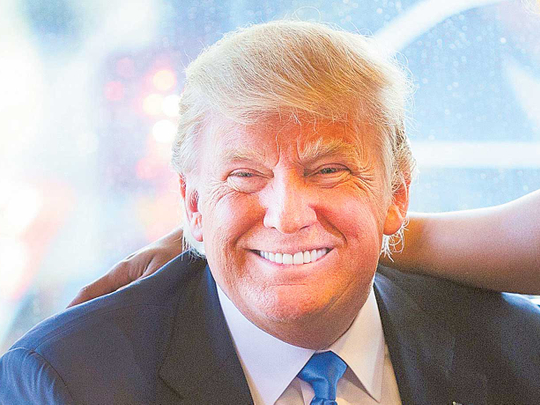
Milwaukee: As recently as three weeks ago, it was looking as though none of the laws of political physics applied to the phenomenon that is Donald Trump.
But the days since his strong showing in the March 15 round of primaries have seen the GOP front-runner make a series of stumbles over his own feet. No longer does he appear to be invulnerable to gaffes and mistakes that would have destroyed a more conventional candidate before the Iowa caucuses.
That is why Trump’s second-place finish to Sen. Ted Cruz in Tuesday’s Wisconsin Republican primary may represent no ordinary setback. It appears to be a pivot point — although it has yet to be seen whether the trajectory from here points downward or upward.
“Either these are the weeks we discovered he had weaknesses he couldn’t overcome, or these are the weeks when he and his team realised they had to get better,” said former House speaker Newt Gingrich. “If he makes the transition to being a really professional presidential candidate, he will be really formidable. And if he does not, he will not be the nominee.”
Trump campaign manager Corey Lewandowski insisted that there will be no major shift in strategy.
“Absolutely not. We have from Day One run the same campaign,” Lewandowski said. “We’re going to continue to execute. We’re not going to blow up the model.”
Yet some recalibration is underway.
Trump thus far has offered few specifics on how he would achieve his grand goals. But on Tuesday he outlined for the first time how he would compel the Mexican government to pay for the wall he proposes for the border between Mexico and the United States, saying he could do it by threatening to cut off the billions of dollars that Mexicans in the United States send back to the country.
He plans to be more specific in coming weeks, with a series of detail-rich speeches on strengthening the military, reforming education and spelling out his criteria for picking justices for the Supreme Court. Lewandowski described the new emphasis as representing “the natural maturation of the campaign.”
As usually happens when a campaign hits a rough patch, there have been predictions of campaign-staff shake-ups in the offing.
But in Trump’s case, there is only one direction in which the finger of blame can be pointed.
The strength and the weakness of his unconventional campaign has been Trump himself. He has functioned in many ways as his own chief strategist, political consultant, policy czar and communications guru.
That is the same way he built his fortune, said campaign spokeswoman Hope Hicks.
“In real estate, he builds a building. It doesn’t matter who the marble vendor is, or who the carpet vendor is, or who’s providing the furniture, or who is the designer. His name is on the building, and it’s his product,” Hicks said. “He sort of approached the campaign very similarly: ‘My name is on this, and nobody else really matters.’ “
The limitations of that approach have become more apparent as the campaign has been spread more thinly and as the field of competitors has narrowed.
Trump’s foes also have seized upon new signs of vulnerability, spending millions to amplify their advertising assaults and organising efforts in Wisconsin and elsewhere.
In Wisconsin, Our Principles PAC, an anti-Trump group, spent $2 million and had a robust, across-the-board operation: television and digital ads, billboards, direct mail, phone calls, and absentee and get-out-the-vote programs.
“Trump didn’t take the time to build out an organisation that could go all the way, and he doesn’t have the infrastructure in various states, to the point he’s not fielding full delegate slates,” said Brian Baker, a senior strategist for the group.
Baker said he saw Trump’s recent hiring of Paul Manafort, a veteran GOP consultant who will be working on convention and delegate issues, as “a de facto acknowledgement that it’s too late to get an organisation together and there will be an open convention.”












